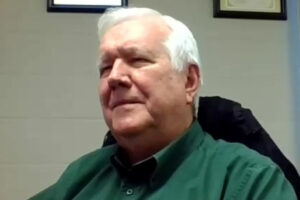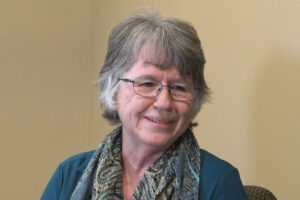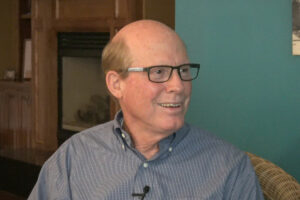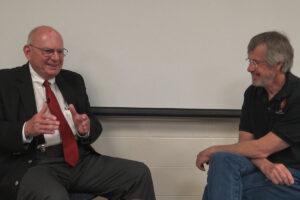Reflections on Water
About this Collection
Reflections on Water is a series of oral history interviews of individuals who shaped state water policy in the 1970s and 1980s. Rex Buchanan, Director Emeritus of the Kansas Geological Survey, conducts the interviews of legislators, natural resource planners, administrators, farmers and environmentalists. See the related blog post and commentary by Rex Buchanan here.

Interview of Mike Dealy, November 24, 2020
Interviewed by Rex Buchanan
In this 2020 oral history interview, Mike Dealy discusses his observations of Kansas water policy implementation during his career as the Manager of a Groundwater Management District (GMD). He reflects on the degree to which water policy permeates all aspects of society and politics. He recalls how the GMD Board's interest in water quality added a dimension to water management that didn't exist in all GMDs. He also notes that changes in the composition of the GMD Board of Directors had an impact on policy development and reflects on the importance of broad representation in the elected Board of Directors. Show MoreThat broad representation ideally can result in cooperation among all water users in a GMD, irrigators, municipalities, and industries, which is key to a successful management plan. Show Less

Interview of H. Edward (Ed) Flentje, June 14, 2019
Interviewed by Rex Buchanan
In this 2019 oral history interview of Ed Flentje, he recalls the intricate work of developing a water planning process and applying good governance principles to a highly contentious issue that involved a variety of entities both inside and outside state government in the 1970s. The innovations in water regulation that grew out of the agenda of Governor Bennett, for whom Flentje served as Planing Director, were carried out and implemented by succeeding Governors, Carlin and Hayden. Flentje's description of water policy rising to prominence in the Bennett administration demonstrates how governors benefit from listening to a variety Show Moreof voices when developing policy agendas. Show Less

Interview of Lon Frahm, June 18, 2020
Interviewed by Rex Buchanan
In this 2020 oral history interview, Lon Frahm describes his involvement in groundwater policy development as a member of Northwest Groundwater Management District No. 4. During the 1990s, he challenged the zero-depletion policy (to take only the amount of water that will be naturally replenished). Frahm supported local control of water management. He observed that over the years control over water planning has shifted to state-level water agencies, particularly the Kansas Water Office, that are not “invested personally” in managing water in northwest Kansas. In his view, state Water Plan funding has resulted in spending that Show Moredoes not help farmers and other local interests. Frahm cites the importance of local culture in setting water policy using as an example the Local Enhanced Management District (LEMA) in Sheridan County. He notes that the success of that endeavor grew out of the shared values of the farmers and a local market for grain. Frahm argues that changes in water use will be very slow over time, and water use should not be held back because we cannot predict the future. Show Less

Interview of Mary Fund, February 10, 2020
Interviewed by Rex Buchanan
In her 2020 oral history interview, Mary Fund talks about her involvement in water policy from the perspective of her work at the Kansas Rural Center (KRC) since the late 1970s. Fund authored Water in Kansas, A Primer, published in 1984 by the KRC. In this interview, she talks about the difficulty of making changes in farming methods that will conserve both water and soil when those changes require farmers to voluntarily alter decades of entrenched farming practice. Fund also observes that shifting the political culture is key to making voluntary changes work.

Interview of Ken Grotewiel, December 5, 2019
Interviewed by Rex Buchanan
In this 2019 oral history interview, former Representative Ken Grotewiel recalls learning about the state and its urban/rural divide in addressing water issues. He found that these issues were not generally decided on a partisan basis. While representing Wichita in the Kansas House of Representatives, Grotewiel developed a good working relationship with Carl Dean Holmes, a Republican House member from western Kansas, especially on water issues, when they served together on the House Energy and Natural Resources Committee. Although Grotewiel had a reputation as a liberal environmentalist, he views his approach as that of a pragmatist. Among the Show Morewater issues addressed during his service in the House were purchasing storage in federal reservoirs that involved “minimum desirable stream flows,” irrigation, “water rights” that can affect streams, and the interbasin transfer of water. Grotewiel describes in some detail the challenges of passing legislation to fund the State Water Plan; legislation strongly opposed by farm groups and irrigators. He sites approval of water plan funding as an example of bipartisan cooperation and as the most significant accomplishment during his time in the Legislature. By the time he was appointed by Governor Sebelius to be Assistant Director of the Kansas Water Office in 2002, he noted considerable breakdown of civility in the Legislature. Among issues Grotewiel worked on during his service in the Water Office were use of federal money to purchase water rights along the Arkansas River and the purchase of land to protect the Equus Beds aquifer along with resisting the Legislature's diversion of Water Plan moneys for other purposes. Show Less

Interview of Joe Harkins, April 24, 2019
Interviewed by Rex Buchanan
In 2019 Joe Harkins sat down for an oral history interview conducted by Rex Buchanan. Harkins describes a career that began in public health and ranged from addressing nursing home problems in Kansas to initiating a graduate program in health administration. Persuaded to take on running the Kansas Water Office, Harkins engaged in transforming the culture of water administration at a time when issues related to water had a high priority in the state. In a detailed discussion of water policy, he discussed the dynamics of the relationship between governors and the legislature in developing, adopting, and funding Show Morea state water plan in the 1980s and early 1990s. Harkins brings the perspective of a professional public administrator to the issue of water policy development. He recalls learning about water policy while he was in charge of developing it. Harkins also has the perspective of a key staff member in several administrations in which water policy was a high priority. He reflects on the importance of gubernatorial leadership and the power dynamics among the various interests that shaped the ultimate policy. Harkins laments that water issues are no longer among the highest priorities in state public policy administration. This interview provides the most comprehensive explanations of policy development in practice in Kansas state government that is available.
Highlights -- short excerpts from the interview















